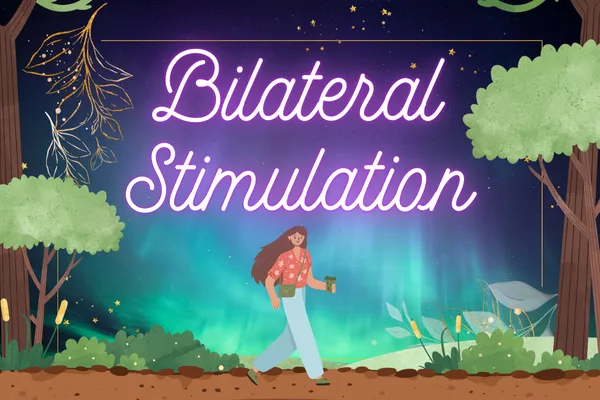
How Bilateral Stimulation is Helpful for Neurodivergent Folx
Bilateral stimulation (BLS) is a technique commonly used in Eye Movement Desensitization and Reprocessing (EMDR) therapy, involving rhythmic, alternating stimulation of the left and right sides of the body. It has shown significant benefits in mental health treatment. For neurodivergent individuals, who often have unique cognitive and sensory experiences, BLS can be particularly beneficial in managing anxiety, trauma, and sensory processing challenges.
What is Bilateral Stimulation?
Bilateral stimulation includes methods such as:
Eye Movements: Following a moving object with the eyes.
Tactile Sensations: Alternating tapping or vibrations on different parts of the body.
Auditory Tones: Listening to alternating sounds in each ear through headphones.
This technique engages both hemispheres of the brain, facilitating improved processing and integration of emotional and cognitive experiences.
Benefits for Neurodivergent Individuals
Enhanced Emotional Processing: Neurodivergent individuals often face challenges with emotional regulation and processing. BLS helps bridge the gap between the emotional and rational centers of the brain, aiding in the processing of difficult emotions and reducing emotional intensity. This can be particularly beneficial for those with heightened sensitivity or difficulty managing stress.
Reduction in Anxiety and Stress: The calming effects of BLS can significantly reduce symptoms of anxiety and stress. By mimicking the brain's natural REM sleep processes, where emotional memories are processed, BLS helps reframe anxious thoughts and reduce overall stress levels.
Improved Sensory Processing: Many neurodivergent individuals, such as those with autism or ADHD, experience sensory processing differences. BLS provides a structured and predictable form of sensory input that helps regulate the nervous system. This can be soothing and help individuals better manage sensory overload or sensitivity.
Trauma Healing: For those who have experienced trauma, BLS used in EMDR therapy can be a powerful tool. It helps in reprocessing traumatic memories, reducing their emotional charge, and allowing individuals to move forward without being held back by past experiences. This is especially important for neurodivergent individuals who may be more susceptible to trauma or have unique ways of experiencing and remembering traumatic events.
Enhanced Cognitive Flexibility: Engaging both sides of the brain through BLS can improve cognitive flexibility and resilience. This is crucial for neurodivergent individuals who may struggle with rigid thinking patterns or find it challenging to adapt to new situations. Increased cognitive flexibility can enhance problem-solving skills and creativity.
Improved Relaxation and Executive Function: BLS can aid in improving relaxation and executive function by promoting a more balanced state of mind. This can help with planning, organizing, and carrying out tasks more effectively, which are often areas of difficulty for neurodivergent individuals.
Practical Applications
Incorporating bilateral stimulation into daily routines can be simple and effective. Here are a few practical ways to use this technique:
Walking or Running: Alternating foot movements provide natural bilateral stimulation. Adding mindful awareness to the rhythm of your steps can enhance the calming effect.
Creative Activities: Engaging in activities like drawing or playing a musical instrument with both hands can stimulate both hemispheres of the brain.
Mindful Tapping: Practicing self-tapping techniques, where you alternately tap your shoulders or knees, can be a quick way to calm your mind during stressful moments.
Listening to Music: Using headphones to listen to music that alternates between ears can be a soothing practice, especially when paired with relaxation exercises.
Conclusion
Bilateral stimulation offers a range of benefits for neurodivergent individuals, from reducing anxiety and improving emotional processing to aiding in trauma healing and enhancing cognitive flexibility. By integrating these techniques into everyday life, neurodivergent individuals can find new ways to manage their mental health and enhance their overall well-being.
